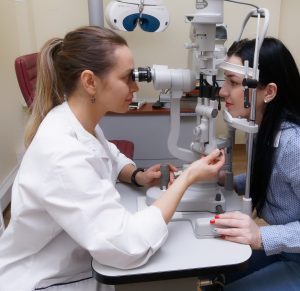
Many people think that once they train for a certain type of profession, they must follow that career path forever.
However, it doesn’t have to be this way, at least not for everyone.
Today, we’ll talk about the various available careers for opticians and what you need to know about them.
Grab a snack or something to drink and read on!
Page Navigation
What is an Optician?
Many people know what opticians do.
These professionals help people with poor eyesight see better.
They also advise their patients which are the best frames and glass lenses for them, considering the individual’s preferences, budget, and needs.
The duties of an optician don’t end there, however, we have other articles that better describe their job, that we recommend you to read.
Opticians have good knowledge of the eyes’ anatomy, neuroscience, ocular microbiology, and other medical aspects related to the eyes.
They’re also trained to operate various machines found in an optometry setting.
How Do You Become an Optician?
To become an optician, you’ll need to first graduate from high school or obtain your GED.
You’ll also need some experience and finishing a training program that can last from 1 to 2 years.
Once you completed these steps, you’re qualified to pass an exam and obtain a certificate.
While all these steps sound simple and require some time, do know that not everyone is a good fit for this occupation.
The ideal optician has traits like the following:
- Good communication skills
- Organized
- A clean criminal background
- Completed the steps mentioned above
Opticians Receive More Certifications
It’s not widely known that opticians can obtain more types of credentials once their training is complete.
Let’s learn a bit more about these credentials!
ABO’s Certificate for Spectacles
The main certification opticians earn is from the American Board of Opticianry’s Certification.
These professionals usually work only with spectacles.
Based on experience, you can earn these credentials, after passing the appropriate exam:
- ABOC: American Board of Opticianry Certification
- ABO-AC: ABO Advanced Certification
- ABOM: ABO Masters Certification
NCLE’s Certification for Contact Lenses
However, with the appropriate certification, the professionals can work with contact lenses as well.
This license is issued by the National Contact Lens Examiners, after passing an exam.
This one also has 3 levels of expertise, as follows:
- NCLEC: National Contact Lens Certification
- NCLE-AC: NCLE Advanced Certification
- NCLEM: NCLE Masters Certification.
These professionals might even have to teach the patients how to care for their lenses, how to insert and remove them.
The ABO and NCLE certifications must be kept active if the professional wants to continue practicing.
Low Vision Specialist
Some opticians choose to undergo specific training to work with blind people or who partially lost their vision.
Not many people know that there aren’t many folks who are completely blind, meaning they don’t even perceive light.
The majority are either legally blind or have options to improve their eyesight.
In this field, the majority of such specialists work as low vision rehabilitators.
They work closely with their patients to discover the reason for their low vision and find the best solution to help them see better.

Other Careers for Opticians
Even though you became an optician, you don’t have to spend the rest of your life practicing this profession.
In fact, opticians do have access to other careers that are not completely related to the medical field.
If you got curious, let’s have a look at some of them!
Lecturer for Continuing Education or Professor
One of the requirements to keep the license current, regardless of industry, is to attend additional classes related to the field.
Of course, classes are usually held by specialized teachers.
Some people like to teach others and if you’re one of them, you could consider holding classes for other opticians.
However, you’ll need to be recognized as an expert, and this is not very easy.
To become a professor, you’ll also need special training and possibly even a Ph.D.
Depending on the position you choose, though you could be holding both, your work environment could be different.
Medical Freelance Writer
Writing is a relatively easy job, if you ask us, of course.
However, not everyone can write just about anything, and medical articles usually require specialized knowledge in the field.
And writing about illnesses and other problems, specifically related to the eyes, is something an optician is qualified to do better than anyone else.
Additionally, because of their background, they can explain better medical terms using plain language.
They could be writing for medical publications, for a clinic, pamphlets related to specific issues or products, and more.
Pharma Consultant
Depending on how much expertise you accumulated as an optician, you could find yourself working as a pharma consultant.
There are many roles available to the most experienced medical professionals, including marketing, research, and development.
Keep in mind that you’ll need specific skills for the role you’ll be taking on.
For instance, if you choose marketing, you’ll need to be able to convince your coworkers and patients that the product you recommend is indeed better.
You might have to participate in or see the research for yourself.
Additionally, you could be expected to also educate everyone on how to handle and care for the product you support.
Marketing roles are usually easier to come by compared to research and development.
This is because for the latter ones you could need an advanced degree in science on top of all your previous degrees and qualifications.
These roles could also be rarer to come across.
Recruiter
Another good position you might want to consider is recruiting.
You could be working within corporate optometry and your skills should focus on discovering some fresh talent for a specific position.
Ideally, you’ll be recruiting personnel for the healthcare industry.
You will also have to educate the new team member on how the organization works, to ensure they’ll be successful.
Recruiters are known to also work across several areas and states.
If you don’t like that much to travel, perhaps this job is not for you.
Where Will You Work?
Based on everything that was mentioned above, opticians can find work in many different settings.
The most common of them include:
- Clinics
- Hospitals
- Shops
- Optometry practices
Opticians have the possibility of opening a practice clinic of their own as well.
For this, additional permits are generally needed, though not more education.
Depending on your jurisdiction, you might have to pass additional exams to obtain the needed permits to run a business.
Of course, if you choose to pursue any other career available, you’ll be working for other types of enterprises.
Conclusion
As you can see, the job of an optician is pretty demanding, especially when it comes to education.
Depending on the employer, the job itself can be more demanding.
The shops and optometry practices probably have the most relaxed environment for the personnel.
In a clinic or a hospital, the personnel, including the optometry specialists, usually has to work night and weekend shifts too.
On the other hand, it can offer many careers opportunities, with some that don’t even have to be in a clinical setting.
Furthermore, the demand for opticians will never go away because everyone will need glasses at some point in their life, due to aging.








